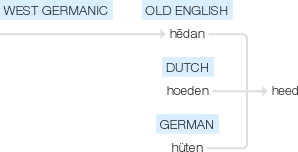Heed
Old English hēdan, of West Germanic origin; related to Dutch hoeden and German hüten .
wiktionary
From Middle English hēden, from Old English hēdan(“to heed, take care, observe, attend, guard, take charge, take possession, receive”), from Proto-West Germanic *hōdijan(“to heed, guard”), from Proto-Indo-European *kadʰ-(“to heed, protect”). Cognate with West Frisian hoedje(“to heed”), Dutch hoeden(“to heed”), German hüten(“to heed”).
etymonline
heed (v.)
Old English hedan "observe; to take care, attend, care for, protect, take charge of," from West Germanic *hodjan (source also of Old Saxon hodian, Old Frisian hoda, Middle Dutch and Dutch hoeden, Old High German huotan, German hüten "to guard, watch"), from PIE *kadh- "to shelter, cover" (see hat). Related: Heeded; heeding.
heed (n.)
"careful attention, notice, regard," early 14c., from heed (v.). Survives only in literary use, in compounds, and as the object of verbs (take heed, etc.).
